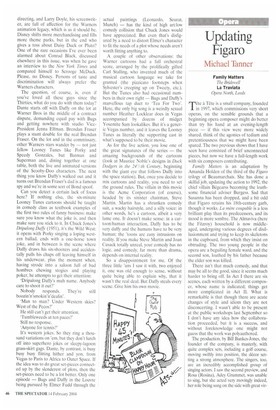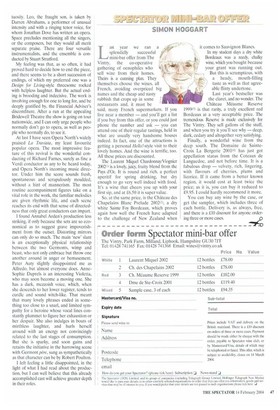Updating Figaro
Michael Tanner
Family Matters The Bndewell La Traviata Opera North, Leeds
Mete a Tete is a small company, founded 1 in 1997, which commissions very short operas, on the sensible grounds that a beginning opera composer might do better than try his hand at an evening-length piece — if this view were more widely shared, think of the agonies of tedium and pretentiousness that we might have been spared. The two previous shows that I have seen have consisted of brief unconnected pieces, but now we have a full-length work with six composers contributing.
Family Matters is an adaptation by Amanda Holden of the third of the Figaro trilogy of Beaumarchais. She has done a skilful job, updating the action to 1992, the chief villain Begearss becoming the loathsome financial adviser Burgess. Sad that Susanna has been dropped, and a bit odd that Figaro retains his 18th-century garb, though it works. La mere coupable is a less brilliant play than its predecessors, and its mood is more sombre. The Almaviva (here the Fitzroy) household is now middleaged, undergoing various degrees of disillusionment and trying to keep its skeletons in the cupboard, from which they insist on obtruding. The two young people in the opera are a beguiling female ward, and the second son, loathed by his father because the elder son was killed, There isn't that much comedy, and that may be all to the good, since it seems much harder to bring off. In Act I there are six scenes, each written by a different composer, whose name is indicated; things get more complicated in Act II. What is remarkable is that though there are acute changes of style and idiom they are not disconcerting. I wasn't able to be present at the public workshops last September so I don't have any idea how the collaboration proceeded, but it is a success, and without foreknowledge one might not guess that the work was polyauthored.
The production, by Bill Bankes-Jones, the founder of the company, is masterly, with quite complex sets, including a golf course, moving swiftly into position, the decor setting a strong atmosphere. The singers, too, are an incredibly accomplished group of singing actors. I saw the second preview, and Rosa (Rosina), Adey Grummet, was unable to sing, but she acted very movingly indeed, her role being sung on the side with great vir tuosity. Leo, the fraught son, is taken by Darren Abrahams, a performer of unusual intensity and with a ringing tenor voice, for whom Jonathan Dove has written an opera. Space precludes mentioning all the singers, or the composers, but they would all merit separate praise. There are four versatile instrumentalists, and the ensemble is conducted by Stuart Stratford,
My feeling was that, as so often, it had proved hard to decide how to end the piece, and there seems to be a short succession of endings, of which my preferred one was a Design for Living-style threesome rocked with helpless laughter. But the actual ending is brooding and indecisive. The work is involving enough for one to long for, and be deeply gratified by, the Financial Adviser's discomfiture. After a run at the appealing Bridewell Theatre the show is going on tour nationwide, and I can only urge people who normally don't go to opera, as well as people who normally do, to see it.
At last I have seen Opera North's widely praised La Traviata, my least favourite popular opera. The most impressive feature of this revival is the wonderful conducting of Richard Fames, surely as fine a Verdi conductor as any to be heard today, and Opera North's incoming music director. Under him the score sounds fresh, spontaneous and scrupulously moulded, without a hint of mannerism. The most routine accompaniment figures take on a vital role in the work, the familiar melodies are given rhythmic life, and each scene reaches its end with that sense of directedness that only great conductors can impart.
I found Annabel Arden's production less striking, if only because the sets are so economical as to suggest grave impoverishment from the outset. Distorting mirrors can only do so much. The main 'new' slant is an exceptionally physical relationship between the two Germonts, wimp and beast, who not only embrace but throw one another around in anger or bemusement. Peter Auty slightly disappointed me as Alfredo. but almost everyone does. AnneSophie Duprels is an interesting Violetta, who may soon become a moving one. She has a dark, mezzoish voice, which, when she descends to her lower register, tends to curdle and sound witch-like. That meant that many lovely phrases ended in something too close to a snarl, and limited sympathy for a heroine whose vocal lines constantly plummet to figure her exhaustion or her despair. She also indulges in bouts of mirthless laughter, and hurls herself around with an energy not convincingly related to the last stages of consumption. But she is sparky, and soon gains and retains the initiative in the harrowing scene with Germontpere, sung as sympathetically as that character can be by Robert Poulton.
I left feeling a little disappointed, in the light of what I had read about the production, but I can well believe that this already accomplished cast will achieve greater depth in their roles.



































































 Previous page
Previous page